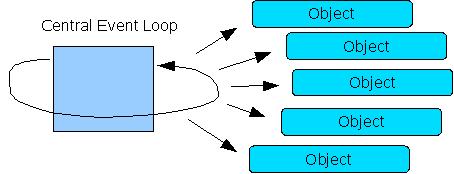Architecture/Proposal/Advanced Threading-Architecture
From Apache OpenOffice Wiki
Type: Proposal State: draft
The advanced threading-architecture aims to solve OOos scalability and responsiveness problems.
Problem
A brief list of problems we face:
- Sometimes unresponsive user interface, e.g. trying to connect to a particular web server may take some minutes, without repaint and everything (it can take more time, if you have more than one http:// reference in your document) ;-).
- Polling / busy waiting, e.g. frequent re-schedule or yield calls, while loading or saving a document.
- Scalability with multiple clients doing API calls, only one API call can be in execution at any time.
- Most long lasting operations such as loading, saving, printing etc. are not interruptible.
Solution
OOo must be changed to be purely event / callback driven. Please see Wikipedia for what event-driven programming is.
The following list gives a first idea, of what should be done,
- all (potentially) blocking calls need to be event-driven,
- all long lasting calls need to be executed by dedicated threads, notifying the consumers via events / callbacks, in case data is available (thus basically creating event sources and event sinks),
- UNIX asynchronous signals, being an process interface by their own, need to be mapped to events,
- Windows window messages need to be mapped to events,
- the threading-architecture must be defined high level, e.g.
- concurrency per application, or
- concurrency per document.
Pros
- Not calling potential blocking system calls leads to 'short' lasting mutex acquisitions.
- No hand crafted reschedules necessary anymore.
- Easy utilization of hyper threading, multiple cores and SMP.
- Controllable CPU utilization and possible avoidance of over utilization.
- 'Simple' architecture.
- Potentially high level thread abstraction.
Cons
- (assumed to be) Hard to implement.
Pseudo Code for event loop:
void dispatch(int signal) {
switch(signal) {
case SIGIO:
fileHandler(getHandle());
break;
case SIGTERM:
...
}
}
int quit;
sigset_t sigset;
int main(void) {
int signal;
while(!quit) {
sigwait(&sigset, &signal);
dispatch(signal);
}
return 0;
}
